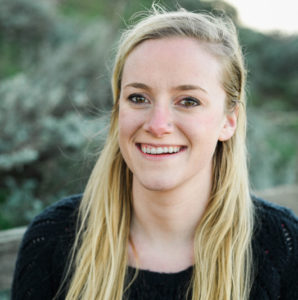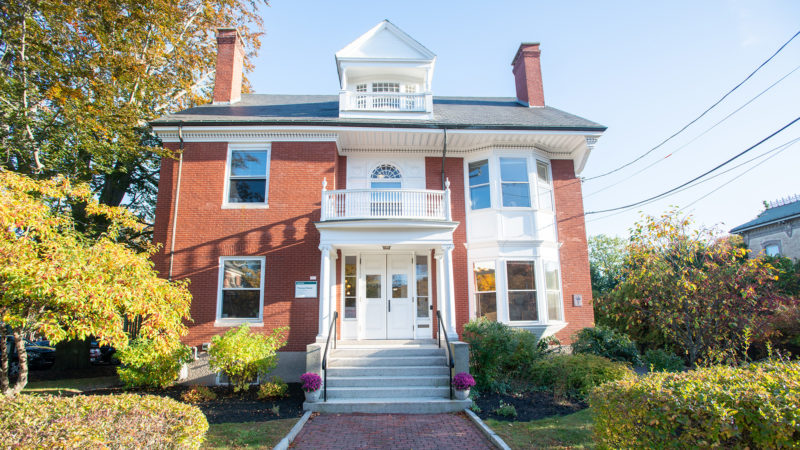Izzy Parkinson ’09 mixes art, technology, and community at Google
Isabel Parkinson ’09 grew up in Kennebunk, but for most of her high school years, she considered herself an honorary Portlander. Immersed in a variety of sports and activities, with many close friends at Waynflete, Izzy often found herself in the city from early in the morning until late at night. “I would stay over at friends’ houses during the week, which was pretty special for high school,” she says. “That sense of independence was great training for college.”
 Independence is a theme that Izzy often returns to when speaking about her years at the school. “Waynflete was structured in many ways, but it was also a place that emphasized autonomy,” she recalls. “Teachers weren’t always telling you what to do—it was often on you. You had to be a self-starter and have the ability to prioritize between studying and socializing. I encountered many people early on in college who felt crippled by their inability to operate independently. We were our own agents in high school. We were primed to be highly independent.”
Independence is a theme that Izzy often returns to when speaking about her years at the school. “Waynflete was structured in many ways, but it was also a place that emphasized autonomy,” she recalls. “Teachers weren’t always telling you what to do—it was often on you. You had to be a self-starter and have the ability to prioritize between studying and socializing. I encountered many people early on in college who felt crippled by their inability to operate independently. We were our own agents in high school. We were primed to be highly independent.”
This sense of autonomy created opportunities for students to explore issues based on their own interests. After attending a workshop on gender identity, for example, Izzy and a friend returned to advocate strongly for an issue that wasn’t even on the faculty’s radar: the creation of gender-neutral bathrooms. The timing was prescient—two years after their recommendations were implemented, Waynflete welcomed its first transgender student.
The Waynflete experience
Izzy was a three-season athlete. “I really loved jumping into new sports and experiences that I didn’t know much about,” she says. Though she had never held a field hockey stick, she joined the team in ninth grade. She also joined the Nordic ski team, whose pre-season was notable for a complete absence of snow—Izzy’s first race marked her first time on skis. She also rowed crew, carrying shells out over the mud at the Fore River Fields launch to reach the water’s edge at low tide. (Today’s rowers use a new dock that is unaffected by tides.)
At a school without bells or detention, where students are granted their first free periods in sixth grade, it’s the close relationships between teachers and students that make it all work. “We revered our teachers,” says Izzy. “The idea of disappointing them was something we couldn’t live with.” Izzy recalls observing with wonder Debba Curtis’s ability to seamlessly weave politics into the history curriculum. Steve Kautz turned her from a student who initially claimed that “math makes me just want to pump gas” to someone who was comfortable with the subject. And Izzy recalls that many Upper School teachers helped her further develop her natural creative writing skills.
College
Izzy had been drawn to the visual arts since childhood. She participated in many art classes while at Waynflete, and still has some of the prints she created hanging in her bedroom in Kennebunk. While her interest in the arts continued after she matriculated at the University of Pennsylvania, then Colorado College, Izzy was becoming more focused on digital art and the incorporation of data visualization. Her sociology studies included work with the spatial mapping of data sets. “These seemingly unrelated interests were beginning to coalesce,” she recalls. “I was studying sociology with a minor in studio art. People would ask me, ‘What are you going to do with that?’ I didn’t know it at the time, but I was training for a job that didn’t exist yet.”
Google and Tilt Brush
That job, when she eventually discovered it, was at Google, headquartered in Mountain View, California. Izzy had considered it “a dream place to work” and had long been interested in the work the company had been doing with data and maps. She connected with a friend who had recently begun working at Google, applied for a job, and after an extensive interview process, was hired to a team that provided support to Google’s corporate clients. It was a foot in the door, and Izzy quickly set about doing as much creative work as she could—in her words, building some “internal design street cred”—through Google’s “20 percent time,” a program that allowed employees to work on side projects.
In 2015, Izzy was in the audience when Google demonstrated a product from a newly acquired company called Tilt Brush. “My jaw hit the floor, and I started sweating,” she recalls laughingly. ”It was the coolest thing I had ever seen.” She immediately reached out to the Tilt Brush team to ask how she could help. After working part-time with the group—again, under the “20 percent” program—Izzy eventually moved to the team as a full-time program manager and producer, helping to launch the product and then evangelize the idea of using creative tools in virtual reality. (The Tilt Brush team, which focuses on “creative experiences,” is part of Daydream, Google’s larger group working on virtual/augmented reality.)
Google launched the Tilt Brush “artists in residence” program in early 2016. More than 60 global creators signed on to create content with—and provide feedback about—the Tilt Brush headset and controllers. Izzy began working on new methods to enable the public to interact with Tilt Brush creations, including smartphone augmented reality apps, 360-degree movies in YouTube, and Google’s own consumer headset and smartphone VR technology. “Until the hardware becomes more accessible, I will be working on ways to share and scale this technology and the stunning art made by artists in this community.”
While Google has grown into a massive global organization, it still—from Izzy’s perspective—comprises many small, close-knit groups. “It’s a big place, with tons of resources, but if you work hard enough, it can be the kind of experience you want it to be,” Izzy says. “I’m such a community-based person, which is why I loved Waynflete and why I now love the community I’m part of here. Smart, creative, and imaginative artists and engineers…it makes it really exciting to come to work every day.”
At Google, few people stay in the same role for more than a year. Izzy has already taken on other responsibilities, in addition to Tilt Brush. In one of her most recent projects, Izzy was the the producer for a pack of augmented reality stickers on Pixel Playground— a new mode in the Google’s Pixel camera that “brings imagination to a scene with superhero cameos, stickers that animate around you, and fun captions that put words where the action is.” Izzy oversaw the entire production process, from concept art to animation production.
The winding path
Izzy remains close to many of her Waynflete classmates and teachers. She returned to help lead an Outdoor Experience trip during her college years, and still keeps in touch with advisor Lowell Libby (the two recently connected at the wedding of Izzy’s best friend from Waynflete).
Her advice to future grads? Don’t fear what might appear to be a nonlinear path:
Follow what you’re really passionate about. For me, that was art and people. It won’t necessarily appear to be a straight line, but with hard work and faith—and putting yourself out there—the right opportunities will reveal themselves. Don’t underestimate the power of working really hard. Take the job that isn’t necessarily the right fit, but could lead to the right opportunity. Stay true to what makes you excited about coming to work every day. The non-linear path can often come together later in something cohesive—“there is often an underlying story there that hasn’t been written yet.”



